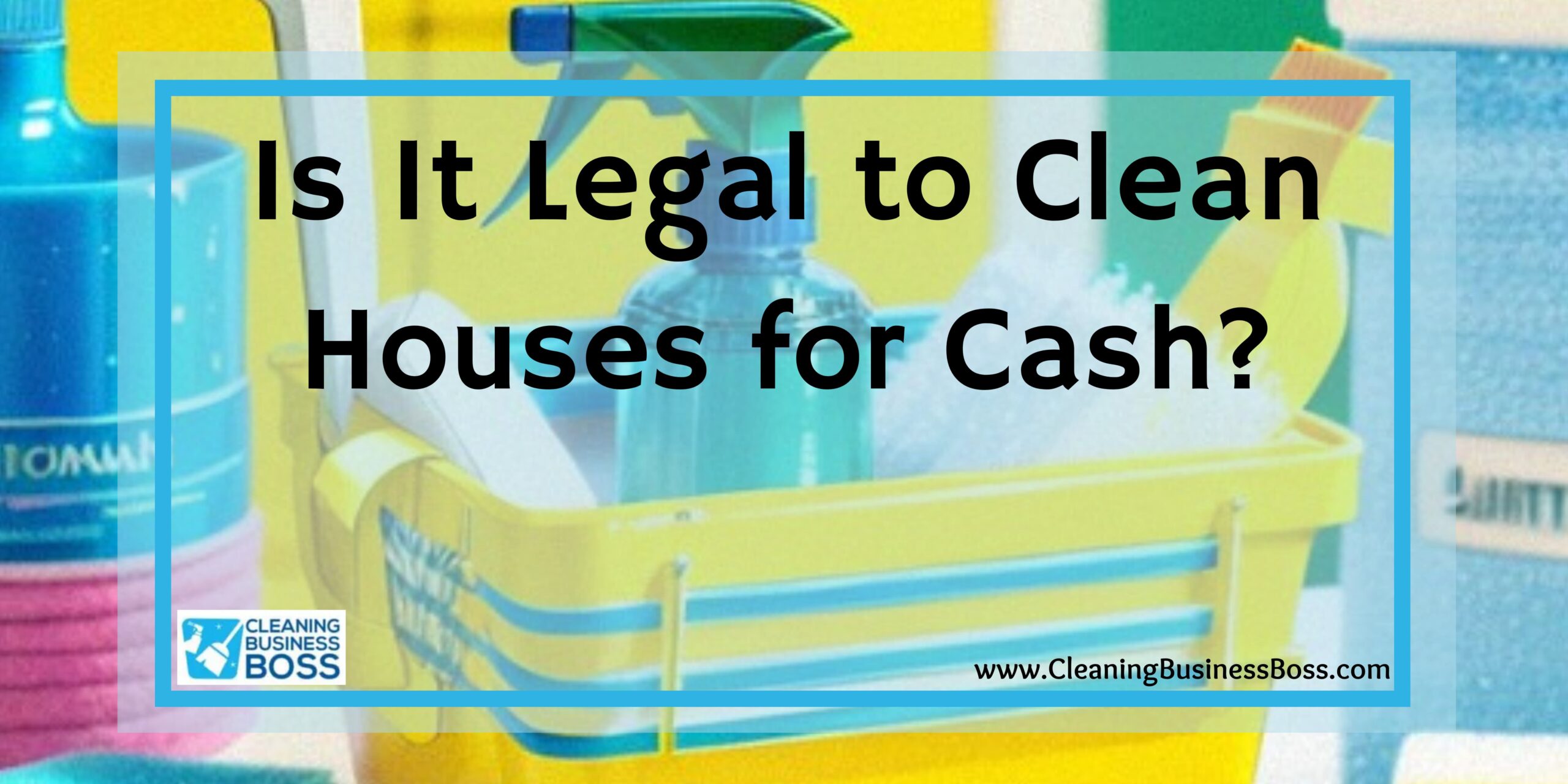If you find yourself with time and a strong work ethic, you might begin to consider ways to use that time and energy to make money. Cleaning houses is one way you can make a considerable profit without a lot of startup expenses or planning. This may make you wonder whether or not you actually need to report your income. It will be important to keep the following information in mind when making this decision.
It is not legal to clean houses for cash. The wages you earn from the individual whose home you are cleaning are taxable wages and must be reported to the government to keep your business endeavor in good standing. If the IRS finds out you are getting paid in cash, you may be audited, fined, or even find yourself in legal trouble.
Once you are audited and fined, there is a very good possibility you will remain on the IRS’s radar going forward. That means the decisions you make in your cleaning business today could follow you for the rest of your life. Read on to learn why reporting earnings is important and has benefits, and how to be sure to start your business in the most legal way possible.
Why it is Important to Report Earnings?
Regardless of where your cleaning business is based out of, there are tax laws in place that require you to report earnings from your business. Making decisions to keep your business in good standing in the eyes of the law is one of the best ways to give your cleaning business the quality start it deserves. That means you need to not only pay attention to these tax laws but pay these taxes.
Another reason to report your earnings is because the type of people who tend to hire household cleaners will be more likely to report that they have hired you in the first place. Consider who would be most likely to hire a cleaning business:
- Doctors
- Lawyers
- Business professionals
- Other high-income earners
These are people who have demanding and unpredictable work schedules, creating a need for cleaning when they are otherwise occupied. They also often have much higher incomes, making them prime candidates for an IRS audit.
Because they have a lot to lose financially, they are likely to have all of their financial ducks in a row when it comes to reporting income. If they are personally audited by the IRS and the IRS finds out that you are cleaning for them, they will check to make sure your reports match theirs.
If there is no report to be found because you have not been diligent about reporting your income, this will be a problem for you and ultimately your cleaning business. This is the last thing you want, especially when you are just starting out!
What Taxes Do I Need to Keep in Mind?

If you, as many cleaning businesses eventually do, decide to hire extra cleaners to broaden your reach, there will be a number of taxes you need to keep in mind:
- FICA tax
- FUTA tax
- Unemployment
- Workers’ Compensation
- State or local income taxes
The FICA tax payment is 15.3% of each employee’s total wages. You will also be required to pay Federal Unemployment Taxes in the amount of 6% of the first $7,000 paid to each employee. The Federal Government requires FICA and income taxes to be reported annually on a Schedule H and 1040 form by the employer.
Reporting requirements do vary by locality and state. Employers will have to verify their requirements for unemployment, workers’ compensation, and any local or state income taxes where the household work is being performed.
Check out this article to know if is it worth it to start a cleaning business or not.
Who Can Help Me Keep Track of This?
One of the best things you can do for your cleaning business is to hire an accountant whom you trust. They will be able to tell you exactly what type of taxes you need to be paying in your area and how to do so. They will also be able to keep the books organized for you, which will be extremely helpful if your cleaning business is ever audited.
Often, the person starting a business is not the best person to calculate all of their taxes — this is okay!
This is exactly why you hire the services of an accountant who is trained to do this work. Those who love to clean are not always the best with tax laws and vice versa. There is no shame in hiring someone to help make your business as legal as possible, just as there is no shame in an accountant hiring the services of someone who can keep their home clean while they work.
The Benefits of Not Paying Cash

Believe it or not, there are actually long-term benefits to reporting the money that is exchanged when your company cleans someone’s home.
The money that is paid for insurance and unemployment taxes now could help you or your employees in the event of injury or job loss in the future. In a way, this is you investing in your business for the day when issues inevitably arise.
Social security taxes also aid employees by providing for them in the future. While they may be inconvenient for you and your cleaners to factor into your finances today, they will certainly be helpful to you all in the long run.
There are several ways to find clients for your cleaning business startup! More importantly, you need to be sure to find quality clients who understand the value you place on keeping your cleaning business legal.
First and foremost, identify who your ideal client would be. Take some time and really consider this question; you don’t want to pitch to just anyone and everyone.
Once you have done this, you can start putting your cleaning business name out there at local events and within business networking groups. This will be a helpful way to connect with people in the know and gain valuable insight into the cleaning business industry.
Finally, it will be time to use this insight to market to your ideal client. It will be especially helpful that you are planning to report all of your earned income to the proper government authorities, because you will have nothing to hide! If you were only exchanging funds in cash, you may be less comfortable marketing far and wide, as you never know who could be watching.
Communication is Key
When you do reach out to offer your cleaning services, assert clearly that you and your employees will not be accepting cash as payment — under any circumstances. You can require all payment to be received in the methods outlined in your contracts and then ask each customer to sign a statement saying that they understand these rules.
You can also require any employees to sign a contract outlining the ways that payment will be accepted. This will reinforce to your team the need to refuse cash if offered. Once a client hears your employee refuse cash once or twice, they will understand you are true to your methods, so really be sure each worker understands this duty.
Yes, this may seem like a lot of extra effort, but starting a cleaning business is not a passive job. It takes a lot of energy and commitment. However, that energy and commitment can stand to gain a significant income over time. When you do this the right way, reporting all income along the way, you will be able to rest assured that you have built your business legally and correctly.
To know how you can start a cleaning business from home, check out this article here.
Forms the IRS Will Look For

A W-2 form will have to be filled out whenever there are employees involved. This means that if you are hiring others to help within your cleaning business, you need to be sure to have a W-2 for each employee.
If you operate your business completely under the table, you might not think to collect this information, since you do not value paying taxes appropriately. However, it is really in your best interest to do so?
The W-2 form shows that the employer paid part or all of Medicare and Social Security taxes, as required. In some states, it is also required that an employer show overtime paid to the employee. Not filing these forms properly could result in legal issues for your cleaning business.
Additionally, as of 2019, if you earned more than $600 annually for an individual client, you are considered a self-employed independent contractor, and are required to fill out a 1099-Misc. form. If you are considered a self-employed independent contractor cleaning houses, you are required to file your own taxes annually.
This is yet another time you should ask your accountant or lawyer for assistance. They will likely need to understand what type of business entity you are before they can make a recommendation. Work with these people from the start of your endeavor and they will be able to help you navigate any and all confusing waters along the way.
Frequently Asked Questions
How do I find a quality accountant?
Finding a quality accountant does not need to be difficult. One way to do this is to ask other local businesses who they use and trust. When someone loves their accountant, it is usually a good sign that they will have your best interests at heart too! If asking around does not work, try searching the internet for accountants in your area. You can even ask them for their prices to make sure you find a professional you can afford.
Are there write-offs?
You may be able to write off expenses accumulated by your housecleaning business. Deducting expenses from income received through your housecleaning service is just one of the many perks of working for yourself. Consider the following expenses and consult with your accountant on which can be written off:
- Cleaning supplies
- Insurance
- Licensing
- Gas or mileage
- Maintenance
- Uniforms
To learn more on how to start your own cleaning business, check out my startup documents here.
Please note that the contents of this blog are for informational and entertainment purposes only and should not be construed as legal advice. Any action taken based on the information provided in this blog is solely at your own risk. Additionally, all images used in this blog are generated under the CC0 license of Creative Commons, which means they are free to use for any purpose without attribution.

About the author. Entrepreneur and Cleaning Business Fan.
Hi! I am Shawn and I am a happy individual who happens to be an entrepreneur. I have owned several types of businesses in my life from a coffee shop to an import and export business to an online review business plus a few more and now I create online cleaning business resources for those interested in starting new ventures. It’s demanding work but I love it. I do it for those passionate about their business and their goals. That’s why when I meet a cleaning business owner, I see myself. I know how hard the struggle is to retain clients, find good employees and keep the business growing all while trying to stay competitive.
That’s why I created Cleaning Business Boss: I want to help cleaning business owners like you build a thriving business that brings you endless joy and supports your ideal lifestyle.



2 thoughts on “Is It Legal to Clean Houses for Cash?”
Comments are closed.